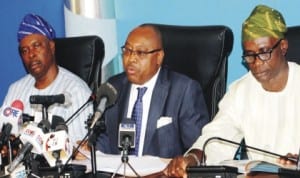Business
Fire Guts Truck At PH Fuel Depot
A tanker laden with refined Petroleum Product was on Sunday destroyed by fire at the Pipeline and product Marketing Company (PPMC) depot inside the Port Harcourt Refinery.
The fire, according to an eye witness, started at about 1.00pm.
The source who pleaded anonymity said that people were surprised to see the fully loaded truck burst into flame.
He said other tanker drivers within the vicinity of the depot tried to extinguish the fire with sand and water, but all to no avail.
He went further to say that distress calls to the Port Harcourt Refinery Company Limited Firefighters were not responded to early enough to put out the fire.
According to the eye witness, the fire may have resulted from an unfinished cigarette that was carelessly dropped by one of the truck boys.
When our reporter visited the scene, he was reliably informed that there were causalities during the inferno.
The truck was seen parked in an isolated area within the depot.
The Tide later sought the view of the PPMC management on the fire incident, but the reporter was told that all the management staff was out at the Okrika Jetty to assess the extent of another fire incident that occurred on the same day.
During a visit to the Independent Petroleum Marketers Association of Nigeria (IPMAN) The Tide met an official who refused to comment on the fire incident.
At the National Union of Petroleum and Natural gas Workers (NUPENG) Petroleum Tankers Unit (PTD) the Union’s official said, the Executive of the union are investigating the immediate and remote causes of the fire incident involving the said truck.
However, normal loading has commenced at the depot as the fire incident did not have any adverse affect on facilities at the depot.

L-R: Special Adviser to Lagos State Governor on Housing, Mr Jimoh Ajao, Commissioner for Housing, Mr Bosun Jeje and Commissioner for Information and Strategy, Mr Lateef Ibirogba, at a news conference by the Commissioner for Housing on the activities of the ministry in Lagos, recently.
Philip Okparaji
Transport
Automated Points Concession : FAAN Workers Gave 72hrs To Revise Decisions In PH

Transport
FAAN Announces Pick-Up Points for Go-Cashless Cards

Business
Fidelity Bank To Empower Women With Sustainable Entrepreneurship Skills, HAP2.0
-
Politics2 days ago
2027: NIGERIANS FAULT INEC ON DIGITAL MEMBERSHIP REGISTER DIRECTIVE
-

 Environment3 days ago
Environment3 days agoLAWMA Director Says Sweeping Reforms Have Improved Waste Collection
-
Politics2 days ago
LP Crisis: Ex-NWC Member Dumps Dumps Abure Faction
-

 Politics2 days ago
Politics2 days agoUmahi Dismisses Allegations On Social Media, Insists On Projects Delivery
-

 Sports2 days ago
Sports2 days agoAbia Not Sure To Secure continental Ticket
-
Sports2 days ago
La Liga: Yamal Records First Career Hat-trick
-

 Sports2 days ago
Sports2 days agoCity Survive Leeds’ Challenge At Elland Road
-
Politics2 days ago
NATASHA ELECTRIC VEHICLES INITIATIVE IN KOGI CENTRAL

